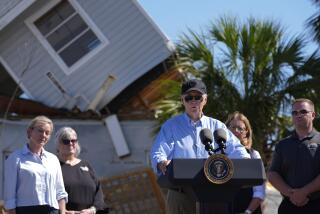U.S. Officials Beseech Floridians to Be Patient
PLANTATION, Fla. — As residents spent hours in line waiting to get food, ice and water in areas hard hit by Hurricane Wilma, federal officials said Wednesday that they responded to the disaster with unprecedented speed and scope, but underestimated the need.
“Of course, demand was very high, and demand outstripped supply,” Homeland Security Secretary Michael Chertoff said in Opa-locka, northwest of Miami, after touring areas by helicopter to view damage caused by the hurricane, which swept across the state Monday.
The number of Florida deaths linked to the hurricane rose to 10, and 2.65 million customers were still without electric power, said Phil Kiracofe, a spokesman at the state emergency operations center in Tallahassee.
To increase the relief supplies on hand, Chertoff said C-130 and C-17 transport planes would airlift stockpiles overnight to southern Florida from other parts of the United States. He said Gov. Jeb Bush vowed that more than 500 trucks would be fanning out to carry supplies to 78 distribution points today.
R. David Paulison, acting director of the Federal Emergency Management Agency whose successor resigned after criticism of how the agency aided the victims of Hurricane Katrina, promised Floridians they would be getting aid.
“We know there are long lines. We ask people to be patient,” said Paulison, who also was in Opa-locka. “And we are going to be sure everybody is taken care of.”
Earlier in the day, Miami-Dade County Mayor Carlos Alvarez said some distribution sites in the greater Miami area were running low on water and ice, and that he was “disappointed, angered” that FEMA hadn’t shipped in more.
The mayor said FEMA officials had been unable to tell him when additional supplies would arrive, and said red tape was preventing local officials from distributing supplies from the site in Homestead, Fla., where FEMA had delivered them.
In Broward County, two of the 16 distribution points ran out of water and ice by afternoon. At Dania Beach City Hall, at least 400 people waited at one point for supplies. At Oakwood Plaza, a shopping center in Hollywood, more than 200 cars queued up.
Michelle Tyacke waited 45 minutes at the shopping center with her daughter and some neighbors for ice and water, which she said she needed to keep food cold.
“I’m a little stressed out,” the Hollywood woman said. ‘But this is all part of living in hurricane territory.”
Local FEMA officials defended the federal agency’s response to Wilma.
“Contrary to what some folks may be saying or seeing in the media, we are furiously moving supplies into the affected areas,” said FEMA spokeswoman Frances Marine in Orlando. “Before Wilma came ashore, we had hundreds of trucks prepositioned, we and the state.”
In the 24 hours after the hurricane made landfall in southwest Florida on Monday morning, more than 360 trucks had brought supplies to the affected areas, Marine said. In the next 24-hour period, more than 500 truckloads were brought in, the FEMA spokeswoman said.
A truck can carry 18,000 liters of drinking water, 8,000 five-pound bags of ice, or 20,000 meals.
“That is an incredibly fast response,” Marine said. “The sheer volume of commodities we’re moving around in South Florida in all those affected counties, we’re doing it faster than we did last year in all those storms.” In 2004, Florida was slammed by four hurricanes.
On Tuesday, Kristin Jacobs, mayor of Broward County, blasted the state government for what she said was its failure to live up to a promise of timely deliveries of water and ice. Things had improved by Wednesday afternoon, she said at a news conference.
“From where we were [Tuesday], the state has really stepped up,” Jacobs said. “FEMA has stepped up.” She said Chertoff and his entourage met with the Broward County leader during a visit to the county emergency operations center in this Fort Lauderdale suburb, listened to her concerns and left with a list of the county’s pressing needs.
“We had a simple message, and that is, generators and fuel,” she said.
In Opa-locka, Chertoff said “an unprecedented amount of food and water and ice was prepositioned” for Wilma. But he said government couldn’t be expected to take care of everybody.
“People have got to take some responsibility for preparing themselves,” Chertoff said. “That means you get yourself three days’ worth of food, three days’ worth of water; you get yourself flashlights, batteries, either a hand-crank radio or a battery-powered radio, a first-aid kit precisely because you know it’s going to take 48 to 72 hours to be able to fully service everyone.”
If government has to assist able-bodied citizens, “we can’t focus on the people who really need help first, those who can’t help themselves,” Chertoff said.
Before flying to South Florida, the Homeland Security secretary met with the governor in Tallahassee. Jeb Bush said he would take personal responsibility for the long waits at centers distributing supplies to storm victims, but that Floridians should have been ready for Wilma.
“People had ample time to prepare. It isn’t that hard to get 72 hours’ worth of food and water,” Bush said.
President Bush, the governor’s brother, was scheduled to visit South Florida today.
In Broward County, 95% of the population, or 850,000 people, were without electricity. Five people were taken to the hospital with carbon monoxide poisoning after running a generator in their home, Jacobs said.
Miami International Airport had reopened, but not all carriers had restored full service, said Miami-Dade County spokesman Seth Kaplan. Fort Lauderdale-Hollywood International Airport was to reopen at 7 a.m. today.
More to Read
Sign up for Essential California
The most important California stories and recommendations in your inbox every morning.
You may occasionally receive promotional content from the Los Angeles Times.










